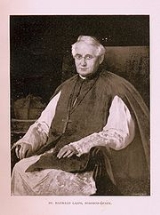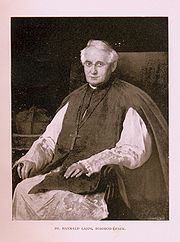
Lajos Haynald
Encyclopedia
Lajos Haynald was a Hungarian
Archbishop of Kalocsa-Bács, naturalist
, and Cardinal
.

in 1833; entered holy orders
on 15 October, 1839, and received the degree of Doctor of Theology
in 1841.
After a brief period spent in the care of souls, he became professor of theology at the seminary at Esztergom
in 1842. The prince-primate, Kopácsy, appointed him his secretary in 1846, but before he had entered upon the duties of that office, dispatched him abroad to study the training of pastors and ecclesiastical administration. Haynald probably was the first Hungarian to study such subjects in foreign countries. He passed most of the time that he spent on his mission in Paris.
On his return he was appointed chancellor-director to the prince-primate, early in 1848. When the Hungarian parliament proclaimed the independence of Hungary on 14 April, 1849, Haynald refused to publish this declaration. The consequence was that he lost his position, whereupon he returned to his birth-place Szécsény. At the close of the Revolutionary War he was restored to his office; on 15 September, 1851, he was appointed coadjutor to the Bishop of Transylvania, Nicholas Kovács, whom he succeeded on 15 October, 1852.
On the publication of the October diploma, in 1860, Haynald became one of the champions of the union of Transylvania
with Hungary. His political opinions and activity thereupon brought him into conflict with the Viennese Government. Count Francis Nádasdy, head of the Transylvanian Chancellery, accused Haynald of disloyalty. Haynald went to Vienna and presented a memorial in which he set forth his political views. Notwithstanding this, the dissensions between the Government and Haynald continued, and resulted in Haynald's resignation in 1864.
Pope Pius IX
summoned him to Rome and appointed him titular Archbishop of Carthage.
Until 1867 he was in Rome as a member of the Congregation of Extraordinary Ecclesiastical Affairs. After the restoration of the Hungarian constitution, Haynald was appointed Archbishop of Kalocsa-Bács, in 1867, at the instance of Baron Joseph Eötvös.
He played an important part in the First Vatican Council
of 1870, being, with George Strossmayer, Bishop of Diakovár, one of the foremost opponents of the dogma of papal infallibility
, although he submitted to the decree of the council. Pope Leo XIII
made Haynald a cardinal in 1879.
As bishop and archbishop, he aimed chiefly to maintain ecclesiastical discipline and to raise the standard of studies in the public schools. His bequests amounted to nearly five millions of gulden
. While still a young priest he devoted himself to botany
and made a large collection of plants and of books, which subsequently came into the possession of the Hungarian National Museum
. The Hungarian Academy of Sciences
made him an honorary member.
Kingdom of Hungary
The Kingdom of Hungary comprised present-day Hungary, Slovakia and Croatia , Transylvania , Carpatho Ruthenia , Vojvodina , Burgenland , and other smaller territories surrounding present-day Hungary's borders...
Archbishop of Kalocsa-Bács, naturalist
Naturalist
Naturalist may refer to:* Practitioner of natural history* Conservationist* Advocate of naturalism * Naturalist , autobiography-See also:* The American Naturalist, periodical* Naturalism...
, and Cardinal
Cardinal (Catholicism)
A cardinal is a senior ecclesiastical official, usually an ordained bishop, and ecclesiastical prince of the Catholic Church. They are collectively known as the College of Cardinals, which as a body elects a new pope. The duties of the cardinals include attending the meetings of the College and...
.

Life
Having completed his studies in the secondary schools, he entered the Emericianum at Pozsony (Presburg) in 1830, remaining there for one year. He studied philosophy at Nagyszombat (Tyrnau) in 1831, theology at ViennaVienna
Vienna is the capital and largest city of the Republic of Austria and one of the nine states of Austria. Vienna is Austria's primary city, with a population of about 1.723 million , and is by far the largest city in Austria, as well as its cultural, economic, and political centre...
in 1833; entered holy orders
Holy Orders
The term Holy Orders is used by many Christian churches to refer to ordination or to those individuals ordained for a special role or ministry....
on 15 October, 1839, and received the degree of Doctor of Theology
Doctor of Theology
Doctor of Theology is a terminal academic degree in theology. It is a research degree that is considered by the U.S. National Science Foundation to be the equivalent of a Doctor of Philosophy....
in 1841.
After a brief period spent in the care of souls, he became professor of theology at the seminary at Esztergom
Esztergom
Esztergom , is a city in northern Hungary, 46 km north-west of the capital Budapest. It lies in Komárom-Esztergom county, on the right bank of the river Danube, which forms the border with Slovakia there....
in 1842. The prince-primate, Kopácsy, appointed him his secretary in 1846, but before he had entered upon the duties of that office, dispatched him abroad to study the training of pastors and ecclesiastical administration. Haynald probably was the first Hungarian to study such subjects in foreign countries. He passed most of the time that he spent on his mission in Paris.
On his return he was appointed chancellor-director to the prince-primate, early in 1848. When the Hungarian parliament proclaimed the independence of Hungary on 14 April, 1849, Haynald refused to publish this declaration. The consequence was that he lost his position, whereupon he returned to his birth-place Szécsény. At the close of the Revolutionary War he was restored to his office; on 15 September, 1851, he was appointed coadjutor to the Bishop of Transylvania, Nicholas Kovács, whom he succeeded on 15 October, 1852.
On the publication of the October diploma, in 1860, Haynald became one of the champions of the union of Transylvania
Transylvania
Transylvania is a historical region in the central part of Romania. Bounded on the east and south by the Carpathian mountain range, historical Transylvania extended in the west to the Apuseni Mountains; however, the term sometimes encompasses not only Transylvania proper, but also the historical...
with Hungary. His political opinions and activity thereupon brought him into conflict with the Viennese Government. Count Francis Nádasdy, head of the Transylvanian Chancellery, accused Haynald of disloyalty. Haynald went to Vienna and presented a memorial in which he set forth his political views. Notwithstanding this, the dissensions between the Government and Haynald continued, and resulted in Haynald's resignation in 1864.
Pope Pius IX
Pope Pius IX
Blessed Pope Pius IX , born Giovanni Maria Mastai-Ferretti, was the longest-reigning elected Pope in the history of the Catholic Church, serving from 16 June 1846 until his death, a period of nearly 32 years. During his pontificate, he convened the First Vatican Council in 1869, which decreed papal...
summoned him to Rome and appointed him titular Archbishop of Carthage.
Until 1867 he was in Rome as a member of the Congregation of Extraordinary Ecclesiastical Affairs. After the restoration of the Hungarian constitution, Haynald was appointed Archbishop of Kalocsa-Bács, in 1867, at the instance of Baron Joseph Eötvös.
He played an important part in the First Vatican Council
First Vatican Council
The First Vatican Council was convoked by Pope Pius IX on 29 June 1868, after a period of planning and preparation that began on 6 December 1864. This twentieth ecumenical council of the Roman Catholic Church, held three centuries after the Council of Trent, opened on 8 December 1869 and adjourned...
of 1870, being, with George Strossmayer, Bishop of Diakovár, one of the foremost opponents of the dogma of papal infallibility
Papal infallibility
Papal infallibility is a dogma of the Catholic Church which states that, by action of the Holy Spirit, the Pope is preserved from even the possibility of error when in his official capacity he solemnly declares or promulgates to the universal Church a dogmatic teaching on faith or morals...
, although he submitted to the decree of the council. Pope Leo XIII
Pope Leo XIII
Pope Leo XIII , born Vincenzo Gioacchino Raffaele Luigi Pecci to an Italian comital family, was the 256th Pope of the Roman Catholic Church, reigning from 1878 to 1903...
made Haynald a cardinal in 1879.
As bishop and archbishop, he aimed chiefly to maintain ecclesiastical discipline and to raise the standard of studies in the public schools. His bequests amounted to nearly five millions of gulden
Austro-Hungarian gulden
The Gulden or forint was the currency of the Austrian Empire and later the Austro-Hungarian Empire between 1754 and 1892 when it was replaced by the Krone/korona as part of the introduction of the gold standard. In Austria, the Gulden was initially divided into 60 Kreuzer, and in Hungary, the...
. While still a young priest he devoted himself to botany
Botany
Botany, plant science, or plant biology is a branch of biology that involves the scientific study of plant life. Traditionally, botany also included the study of fungi, algae and viruses...
and made a large collection of plants and of books, which subsequently came into the possession of the Hungarian National Museum
Hungarian National Museum
- History:The Hungarian National Museum is said to have been founded in 1802 when Count Ferenc Széchényi set up the National Széchényi Library. This would then be followed a year later by the donating of a mineral collection by Széchényi’s wife. This led to the creation of the Hungarian National...
. The Hungarian Academy of Sciences
Hungarian Academy of Sciences
The Hungarian Academy of Sciences is the most important and prestigious learned society of Hungary. Its seat is at the bank of the Danube in Budapest.-History:...
made him an honorary member.

